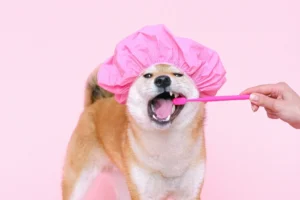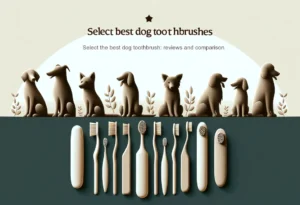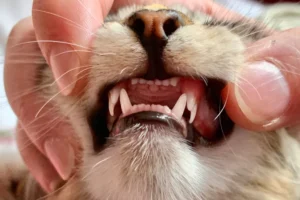Cats seem to effortlessly maintain their oral hygiene without ever needing to pick up a toothbrush. Have you ever wondered why this is the case?
Cats have a unique way of keeping their teeth clean compared to humans, thanks to their evolutionary traits. Let’s explore why cats do not have to brush their teeth.
1. Anatomy of a Cat’s Teeth
Cats have a unique dental structure that sets them apart from humans. Their teeth are sharp and pointed, designed for tearing and shearing meat. Unlike human teeth, a cat’s teeth are not suited for grinding or chewing hard foods. Cats have 30 teeth, including incisors, canines, premolars, and molars. Their sharp canines are particularly effective for hunting and eating prey in the wild.
2. Natural Cleaning Mechanisms
Cats are meticulous groomers, and their grooming habits extend to their dental hygiene. One key natural cleaning mechanism is their rough tongues. Covered in tiny barbs, a cat’s tongue acts like a natural toothbrush, helping to remove food particles and bacteria from their teeth. Additionally, cats’ saliva has antibacterial properties that can help prevent the buildup of plaque and tartar.
Moreover, chewing on raw meat, bones, or dental treats can also help keep a cat’s teeth clean by mechanically scraping away plaque. Providing appropriate toys for chewing can also stimulate a cat’s gums and help keep their teeth healthy. Regular veterinary check-ups are crucial, as a vet can detect any dental issues early on and provide proper care to maintain your cat’s oral health.
By understanding the unique anatomy of a cat’s teeth and their natural cleaning mechanisms, you can appreciate why cats do not need to brush their teeth like humans do. However, it is still essential to monitor your cat’s dental health and take proactive steps to ensure their teeth stay clean and healthy.
3. Diet’s Role in Dental Health
A cat’s diet plays a crucial role in maintaining good dental health. Quality cat food that is specifically formulated to promote dental health can help prevent the buildup of plaque and tartar. Look for options that are labeled as promoting dental health, as they often contain ingredients that help reduce bacteria in the mouth. Additionally, dry cat food can be beneficial as it helps clean the teeth as the cat chews.
It’s important to avoid feeding your cat excessive amounts of soft or wet food, as these can stick to their teeth and create a breeding ground for bacteria. Regularly giving your cat dental treats or toys designed to promote dental health can also contribute to keeping their teeth clean and healthy. Remember, a well-balanced diet not only benefits your cat’s overall health but also plays a significant role in maintaining their oral hygiene.
4. Chewing Habits
Cats have unique chewing habits that naturally help with their dental health. One interesting fact is that their teeth are designed to tear and shear food, which can help keep their teeth clean as they eat. Chewing on hard toys or treats can also assist in preventing plaque buildup and keeping their teeth strong.
When cats chew on items, it helps stimulate saliva production, which in turn can help wash away food particles and bacteria. Providing your cat with appropriate toys and chew treats can encourage this natural behavior and aid in maintaining their oral hygiene. Remember to choose toys that are safe and specifically designed for cats to chew on to avoid any potential hazards.
Additional Insight:
– Regular veterinary check-ups are essential for monitoring your cat’s dental health and addressing any potential issues early on. Your vet may recommend professional dental cleanings to ensure your cat’s teeth and gums are in optimal condition. Remember, prevention is key when it comes to maintaining your cat’s dental health.
5. Signs of Dental Issues
Cats may not need to brush their teeth, but it’s crucial to monitor their oral health for any potential problems. Keep an eye out for red flags that could indicate dental issues such as bad breath, swollen gums, excessive drooling, reluctance to eat hard food, or pawing at the mouth. If you notice any of these signs, it’s essential to consult your vet promptly to address any underlying concerns.
6. Regular Veterinary Check-ups
Even though cats may not require regular brushing, routine vet check-ups play a vital role in maintaining their oral health. Veterinarians can conduct thorough examinations to spot any dental issues early on, provide professional cleanings if necessary, and offer guidance on at-home care. These check-ups are crucial for ensuring your feline friend’s teeth and gums stay healthy throughout their life.
Additional Unique Insight:
Did you know that dental problems in cats can lead to serious health issues beyond just tooth decay? Untreated dental issues can contribute to systemic problems like kidney disease, heart conditions, and even impact a cat’s overall well-being. This serves as a reminder of the importance of staying vigilant about your cat’s oral health and seeking prompt veterinary care when needed.
Remember, while cats may not need to brush their teeth like humans do, proactive monitoring and regular vet visits are key to ensuring their dental health remains in top shape.
7. Chew Toys and Dental Treats
If you want to keep your feline friend’s teeth in top-notch condition without the hassle of brushing, chew toys and dental treats can be a game-changer. Not only are they fun for your kitty to play with, but they also serve as natural teeth cleaners. The gnawing action on the toys helps remove tartar and plaque buildup, which can contribute to dental issues down the line. Look for toys specifically designed to promote dental health, such as ones with ridges or textures that help scrub teeth as your cat chews on them. Additionally, dental treats are a tasty way to encourage chewing while providing additional oral care benefits. Just remember to choose treats that are appropriate for your cat’s size and age to ensure they’re both safe and effective.
8. Interesting Fact: Cat’s Tongue
Did you know that a cat’s tongue is not only rough but also plays a vital role in their dental care routine? The unique texture of a cat’s tongue, covered in tiny hook-like structures called papillae, acts as a natural toothbrush. As your cat grooms themselves, these papillae help remove food particles and debris from their teeth, reducing the need for brushing. So, the next time you observe your feline friend meticulously licking their fur, know that they are also maintaining their dental hygiene in their own fascinating way.
Additional Insight: Proper Dental Care
While chew toys and dental treats can aid in keeping your cat’s teeth clean, it’s essential to schedule regular dental check-ups with your veterinarian. Professional cleanings and exams can help catch any potential issues early on and ensure your cat’s oral health is in top shape. Just like us, cats can develop dental problems that require professional attention, so staying on top of their dental care is crucial for their overall well-being.
Alex, a passionate animal lover, has experience in training and understanding animal behavior. As a proud pet parent to two dogs and three cats, he founded AnimalReport.net to share insights from animal experts and expand his knowledge of the animal kingdom.




